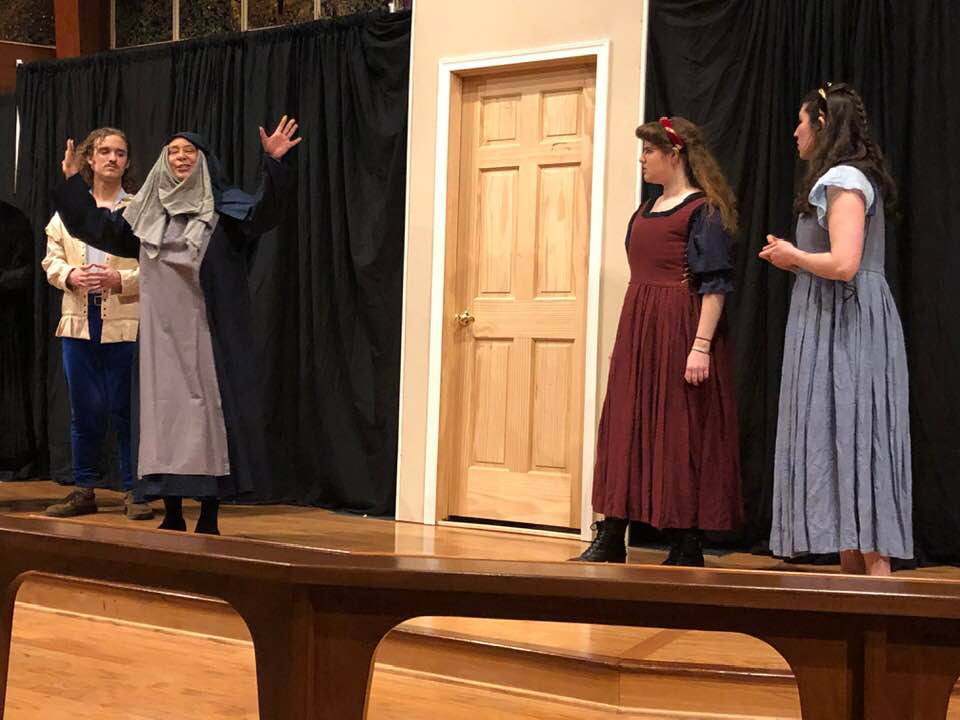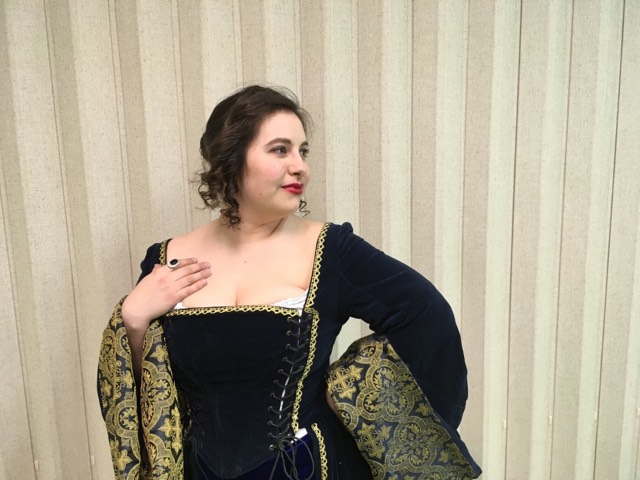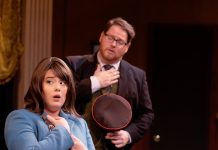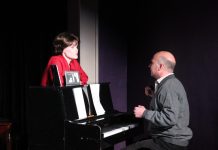By Daniel Rinehart
Britches and Hose Theatre Company’s production of William Shakespeare’s The Comedy of Errors begins with a boisterous crowd scene. Then suddenly a great lord and a prisoner enter.

The lord, Duke Solinus (Dave Seidman-Joria) and the prisoner, Aegeon (Robert Heinly) proceed to discuss Aegeon’s predicament: Aegeon has been captured trespassing in Ephesus, and his life is forfeit if he cannot pay an exorbitant ransom. Aegeon tells his sad story while the crowd cheers and boos and a dumb-show illustrates Aegeon’s narration.
A great deal appears here that is indicative of this production’s strengths: unity of ensemble, eagerness to play big, and willingness to hold the audience’s hand through potentially confusing exposition. Individual actors shine but gain greater luster from association with one another. Seidman-Joria and Heinly sound like they’re in an elocution contest, and it’s a treat; Heinly, in particular, has the kind of Alan Rickman-esque voice one would listen to if he were reading the phone book.
The plot of The Comedy of Errors depends on an implausible backstory that sets up an implausible series of misidentifications. Two sets of identical twin brothers — Aegeon’s sons, both named Antipholus, and their servants, both named Dromio — were separated at an early age. One Antipholus and one Dromio ended up in Ephesus, where the play takes place; the other Antipholus and Dromio ended up in Syracuse. The Syracusan Antipholus and Dromio arrive in Ephesus and the townspeople immediately confuse them with their long-lost Ephesian twin brothers. Hilarity ensues.
This premise creates several problems and opportunities for a company that undertakes it. The main problem, of course, is to cast not one but two sets of twins who are plausibly confused by the other characters but easy for the audience both to distinguish and to keep track of. Director Will MacLeod and Assistant Director Ariana Colligan found an elegant solution: cast men (Jeffrey Elmore and Jonathan Udlock) as the native Ephesian Antipholus and Dromio and women (Hannah Neville and Sarah Souser) as their interloping Syracusan brothers.
Another problem (or opportunity, depending on what the company makes of it) is the sheer brazen ridiculousness of the scenario and the plot. This play demands actors who do not take themselves too seriously. It calls for enthusiastic, passionate performances that shamelessly but winkingly present a series of bald-faced absurdities. This cast delivers.
Megan Fraedrich as Adriana fully embodies the role of a long-suffering wife who is enjoying every minute of her long-suffering. In a production full of great physical acting, she stands out, with sweeping melodramatic gestures that start in her arm and end with her skirts twirling and billowing. Adriana’s counterpart, her more demure sister Luciana, is played with great sweetness and charm by Stephanie Oden. Luciana and Adriana are one of the three key pairs that anchor the show, and Oden and Fraedrich have a lovely rapport.

The other two key pairs are Antipholus and Dromio of Ephesus and Antipholus and Dromio of Syracuse. Udlock delights as the deadpan, put-upon Dromio of Ephesus. Elmore (nominated recently for Washington Area Theatre Community Honors for playing Renfield in Little Theatre of Alexandria’s Dracula) plays the increasingly frustrated and furious Antipholus of Ephesus with verve and panache, culminating in an uproariously manic final monologue.
The situation of the Syracusan Antipholus and Dromio is reminiscent of Sebastian in Twelfth Night, marooned in a strange place where everyone affects to know them and nothing that happens makes sense. The treat here is that where Sebastian must undergo his Illyrian journey alone, Antipholus and Dromio of Syracuse undertake theirs together. Neville’s and Souser’s shared incredulity and amazement as they compare experiences and try to make sense of the nonsensical is a joy to behold, to say nothing of their carefully choreographed but apparently effortless joint physical acting.
This is an ensemble piece, and the ensemble is very strong: Krista Grimmett’s powerful abbess; Betsy Ryan’s bewildered goldsmith; Leandra Lynn’s Balthazar, a sensible sidekick; Rachael Dickson’s hapless, mustachioed merchant; Thomas Udlock’s outrageously accented Frenchman; Anastasia Brunk’s beguilingly coquettish Courtezan; Wendy Briggs’ excitable maidservant; Margaret Carson’s self-important conjurer; Connie Ramsey’s dutiful Gaoler. The sumptuous costumes, by Elizabeth Weiss, complement every character perfectly.
Marjorie Garber, in the introduction to her seminal work Shakespeare After All, refers to a senator’s quotation from The Comedy of Errors shortly after the terrorist attacks of September 11, 2001: “Grief hath changed me since you saw me last.” As Garber points out, the situation in The Comedy of Errors, a long separation between family members, does not apply very well to the sudden shock and sorrow of a terrorist attack. It is true, though, that our griefs of whatever kind change us. The highest and truest purpose of comedy is to help us suspend disbelief for a moment and imagine that these sad things might all somehow come right: to remind us of an ideal and to strengthen our faith in that ideal; to help us remember how wonderful it would be if those we have lost were restored to us, and friends we never knew we had were added to us — to help us imagine a day when we take hands with a stranger who has miraculously become family, and rejoice together.
This production of The Comedy of Errors just might do that for you. It did for me.
Dan Clark is the technical director, set designer, and sound designer. Arielle Seidman-Joria is the stage manager.
Running Time: Approximately two hours and 10 minutes, including one 15-minute intermission.
Britches and Hose Theatre Company’s production of William Shakespeare’s The Comedy of Errors plays at Holy Trinity Lutheran Church, 3022 Woodlawn Avenue, Falls Church, VA, on Friday, March 22 and Saturday, March 23 at 8:00 pm and on Sunday, March 24 at 4:00 pm. Tickets can be purchased at the door for $15, or $10 for students, seniors, and military personnel with ID.




